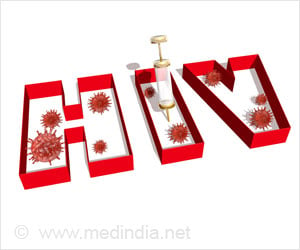The mechanism of entry of HIV infection, preventing attack by host immune system, has been identified for possible better targets of therapy.
Highlights
- A research team carried out a study to identify how HIV overcomes the great barriers of the mucosal bottle neck to invade the body of the host.
- Certain strains of the HIV 1 virus were 3 times more infectious and 1.4 times increased ability to replicate.
- They were more resistant to IFN-alpha2 and IFN-beta of the immune system than other strains.
Therefore, Dr. Hahn and her research team studied the nature of these HIV-1 strains to determine how they successfully passed through the genital mucosa, which formed the boundary of entry for various micro-organisms.
Studying Viral Isolates
The viral isolates from the genital secretions and blood of 8 donors with chronic HIV infection and their matched recipients were studied. The researchers identified a sub population of HIV– 1 strains which had biological properties that enabled them to efficiently cause new infections. The results of the findings were published in a study in Proceedings of the National Academy of Sciences.Findings of the Study
- 300 virus isolates were identified by the research team from individual HIV-1 particles that were found to infect the donors as well as the matched recipients.
- Recipient viruses were three times more infectious than viruses isolated form the donors.
- The recipient viruses had a 1.4 increased ability to replicate.
- They were significantly more resistant to the anti-viral effects of interferons, IFN-alpha2 and IFN-beta.
- The transmitted viruses when compared to donor viruses needed an 8-fold higher concentration of IFN-alpha2 along with a 39-fold higher concentration of IFN-beta in order to be able to produce a 50% reduction in replication.
- The odds of the strains of HIV that were found to be interferon-resistant, where the highest IFN-alpha2 and IFN-beta doses were 35-fold and 250-fold greater.
The recipient isolates were found to be released from the infected CD4 cells more efficiently than the donor isolates. The important aspect of the transmission is the production of cell free particles.
Mucosal Bottleneck
The study was able to identify the factors of the virus that was able to overcome the mucosal bottleneck. The HIV-1 strains that were able to replicate and which were able to spread efficiently even when they were faced with a strong immune reaction were the ones that were successful in moving past the mucosal barriers.Primary HIV-1 Infection
The HIV-1 infection can occur through mucosal barriers or through inoculation. The dendritic cells are the first to attack the viruses when the HIV-1 binds to the receptors of the dendritic cells. At this stage, it was believed that the dendritic cells were antigen presenting cells that aided in priming T cells with raid infection of the T cells.- The CD4+ T cell receptor
- A 7-transdomain chemokine co-receptor.
The initial infection of HIV-1 requires a highly dynamic relationship between virus and host. The symptoms that develop are associated with a large amount of virus in the body and the response of the host’s immunological process.
The identification of the exact mechanism that exists for the entry of certain strains of HIV into the body can be used to strengthen the immune system as well as develop new strategies for treatment. This would not only prevent the spread of infection but will also provide new targets for therapy.
References:
- Shilpa S. Iyer, Frederic Bibollet-Ruche, Scott Sherrill-Mix, Gerald H. Learn, Lindsey Plenderleith, Andrew G. Smith, Hannah J. Barbian, Ronnie M. Russell, Marcos V. P. Gondim, Catherine Y. Bahari, Christiana M. Shaw, Yingying Li, Timothy Decker, Barton F. Haynes, George M. Shaw, Paul M. Sharp, Persephone Borrow, Beatrice H. Hahn. Resistance to type 1 interferons is a major determinant of HIV-1 transmission fitness. Proceedings of the National Academy of Sciences, 2017; 201620144 DOI: 10.1073/pnas.1620144114
- Primary HIV Type 1 Infection - (http://cid.oxfordjournals.org/content/38/10/1447.full)
















